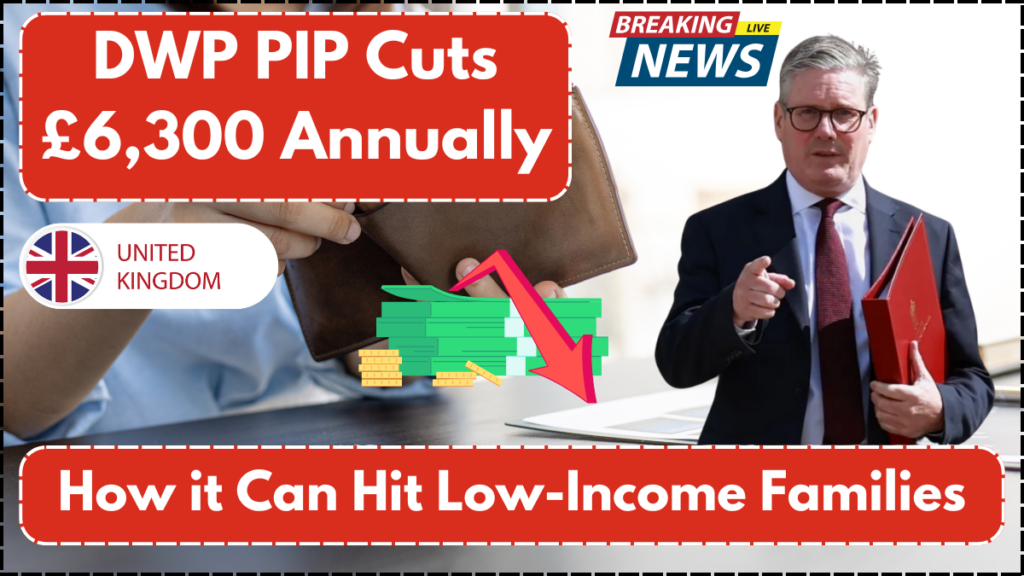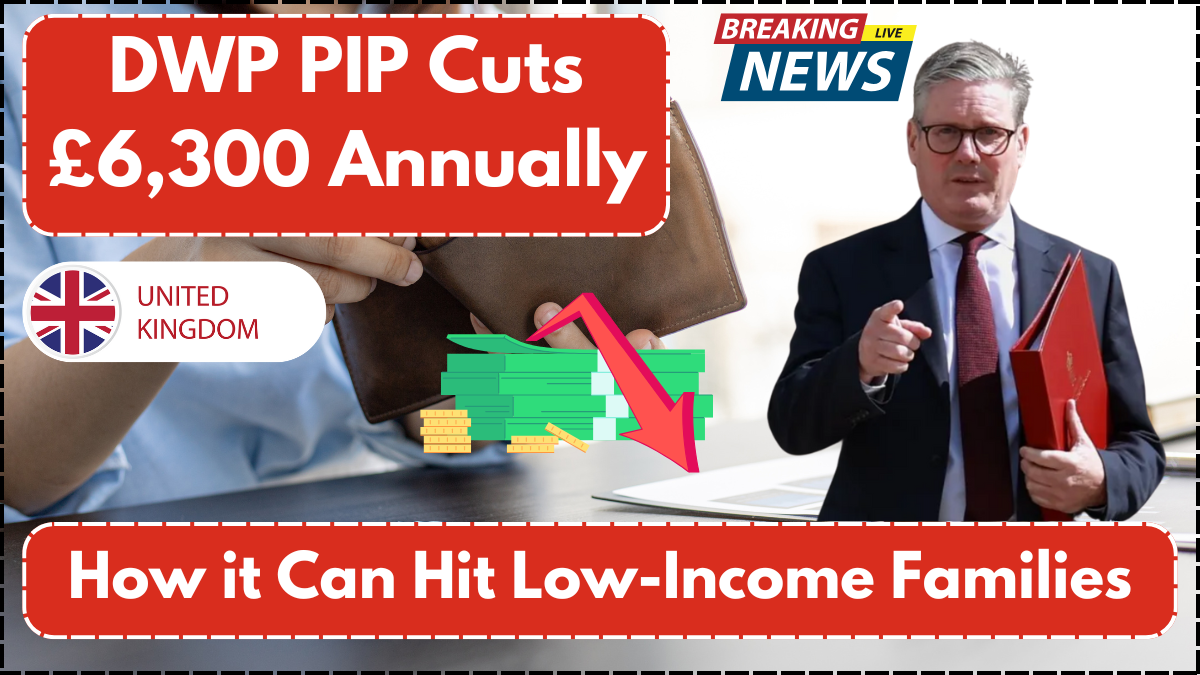As of May 2025, the UK government is pushing forward with sweeping changes to Personal Independence Payment (PIP), potentially reducing annual support by up to £6,300 for some recipients. These reforms are part of a broader effort by the Department for Work and Pensions (DWP) to reduce welfare spending, aiming to save £5 billion annually by 2029-30. While the DWP cites sustainability and targeting as core reasons, the impact on vulnerable populations—including disabled individuals, low-income families, and young adults—is expected to be significant.

Key Facts and Projected Impact
| Category | Details |
|---|---|
| Topic | DWP PIP Reductions (up to £6,300/year) |
| Affected Individuals | Over 1.2 million claimants at risk of losing eligibility |
| Financial Loss | £4,200 to £6,300 annual reduction for some recipients |
| Poverty Risk | 250,000 more people, including 50,000 children, may fall into poverty |
| Government Savings Goal | £5 billion/year by 2029-30 |
| Target Groups | Disabled individuals, mental health sufferers, low-income households |
| Source for Updates | GOV.UK PIP Page |
What Is PIP and Why Is It Being Reformed?
Personal Independence Payment (PIP) is a financial benefit that helps people with disabilities manage extra costs related to mobility and care. As of 2025, the government is questioning the sustainability of the current PIP framework, stating that too many recipients receive benefits for manageable conditions. In response, proposed changes include:
- Tighter eligibility criteria
- Replacing cash benefits with one-off payments, vouchers, or practical support
- Focus on employment assistance and mental health services over direct payments
Who Will Be Most Affected by the Cuts?
Individuals with Mental Health Conditions
Claimants with conditions like PTSD, anxiety, or depression may no longer meet revised eligibility standards. Invisible disabilities are at higher risk of being deprioritized in assessments.
People with Fluctuating or Variable Illnesses
Those with conditions like Fibromyalgia, ME/CFS, or Multiple Sclerosis may struggle to prove consistent need due to variability in symptoms, leading to a higher risk of disqualification.
Young Disabled Adults
People aged 18–30 are an increasingly vulnerable group. Reduced access to PIP may hinder their ability to pursue education, gain employment, or live independently.
Single-Parent and Low-Income Families
Families that rely on PIP for stability face significant financial disruption. Loss of benefits can increase reliance on food banks, local charities, and emergency support schemes.
Real-World Implications of the Cuts
- Mental Health Deterioration: Financial insecurity is likely to increase stress, anxiety, and depression among claimants.
- Rising Dependence on Charities: Organizations like Scope and Disability Rights UK expect increased demand for essential services.
- Increased Poverty: The government’s own impact analysis estimates an additional 250,000 people could fall below the poverty line, including tens of thousands of children.
Why the Government Is Pursuing These Reforms
The DWP claims the goal is to ensure that PIP serves only those with the most severe conditions, reducing fraud and promoting independence. Ministers suggest transitioning to non-financial support where possible, such as providing equipment, therapy, or employment training.
However, critics argue that the reforms are primarily fiscally motivated. The Resolution Foundation and other policy groups warn that the changes could worsen social inequality and cause long-term harm to vulnerable groups.
Steps You Can Take Now
Reassess Your Eligibility
Use the online eligibility tool on GOV.UK to understand how the proposed changes could impact your current benefits.
Prepare Comprehensive Medical Evidence
Gather medical records, care plans, and personal documentation now. These materials may be crucial if you’re reassessed under the new criteria.
Seek Support from Advocacy Groups
Organizations like Citizens Advice, Scope, and Turn2Us offer guidance on navigating benefit changes, filing appeals, and accessing additional services.
Stay Informed
Subscribe to updates from trusted sources and monitor changes via GOV.UK and reputable news outlets. Early awareness is critical for adapting to upcoming changes.
Conclusion
The DWP’s proposed PIP cuts in 2025 mark one of the most significant welfare reforms in recent years. While the government emphasizes efficiency and sustainability, the practical consequences for millions of disabled and low-income individuals could be severe. Now more than ever, staying informed, gathering documentation, and seeking support are key steps for those who may be affected. Advocacy, awareness, and preparation will be essential tools in navigating the months ahead.
FAQ
What are the proposed DWP PIP changes in 2025?
The UK government is planning to reduce Personal Independence Payments by tightening eligibility and shifting away from direct financial support. Instead, claimants might receive practical assistance or one-time grants.
Who will be affected most by the PIP reforms?
The most affected groups are likely to include individuals with mental health conditions, people with variable illnesses, young adults with disabilities, and low-income families relying on PIP.
When will these changes take effect?
While specific timelines are yet to be confirmed, most changes are expected to roll out gradually starting late 2025, with full implementation by 2029-30.
What should I do if I’m currently receiving PIP?
Start by reviewing your current claim, collecting updated medical evidence, and staying in touch with advocacy organizations. Prepare now to navigate the reassessment process effectively.
How can I appeal if I lose my PIP benefits?
You can appeal through the DWP’s mandatory reconsideration process. If unsuccessful, you have the right to escalate to an independent tribunal. Charities like Citizens Advice can help with this process.
For More Information Click Here
Pari is a passionate writer known for captivating stories that blend imagination and reality. Inspired by travel, history, and everyday moments, Pari crafts narratives that resonate deeply with readers.




